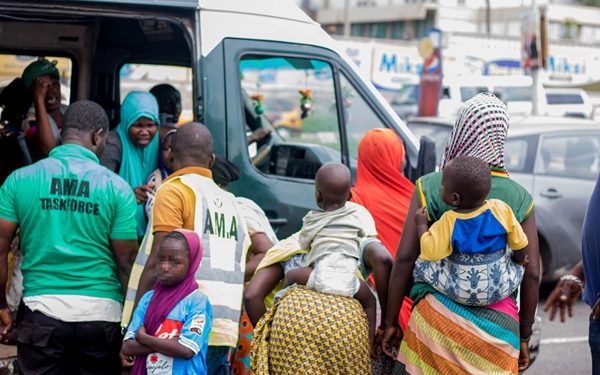The Accra Police Command has warned that a series of operations to remove child beggars from the streets of Accra will begin shortly.
Child beggars abound on the streets of Accra’s main neighborhoods, including Madina, Osu, Ridge, Achimota, and Lapaz, among others. The majority of the beggars are thought to be from other West African nations.
Some Ghanaians, according to the Police Command, bring these children into Ghana from neighboring countries to be used for “commercial begging.”
ACP Kwesi Ofori, the Director of Operations of the Accra Police Command, informed Citi News that his force is determined to apprehend these criminals.
“You may have seen a number of children from other West African countries on our streets right now. Contractors transport [them to Ghana] and put the children in vantage points where they can beg. The Regional Police Command in Accra will look into it.”
“There are a lot of kids on the highway. We’ll be descending on the contractors who go to neighboring countries to carry the girls, collect the capital, and prosper in the end,” he added.
Ridding Accra of street children, beggars
Previously, city officials attempted to exclude street children and beggars from Accra’s streets.
In a special exercise organized by the Accra Metropolitan Assembly (AMA), children suspected to be from Niger and Nigeria were picked up from some ceremonial roads, highways, under bridges, and in traffic, begging for alms from benevolent individuals.
The Mövenpick Hotel, the Trade Union Congress (TUC), the Cathedral, the 37 Military Hospital, Airport City, Airport Junction and Accra Mall, the Spanner Junction traffic light, and the Ghana Standards Board (Shiashie) were among the other places visited.
The group also visited the Kaneshie overhead bridge, Nima and Maamobi, as well as the traffic intersections at Sunny FM, Okponglo [Ghana Standards Authority (GSA), and the Graphic Road stretch.
Read Also: Plane bound for Kumasi forced to land in Côte d’Ivoire due to bad weather
The AMA worked with the Department of Social Welfare to help these individuals reform and reintegrate into society.
They also picked up beggars and children who had set up camp near the Tetteh Quarshie Interchange’s footbridge, as well as prominent bus terminals such as the Neoplan Bus Stop in Achimota, Circle, Kaneshie, and the Korle-Bu traffic light.
The Assembly encouraged the people to comply and refrain from giving money to beggars on the streets, as doing so might constitute a violation of the Beggars and Destitute Act, 1969 (PNDCL 392), which makes begging and giving to beggars illegal.
SOURCE: ATLFMONLINE

























